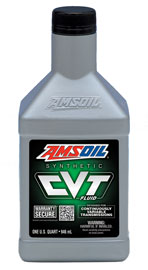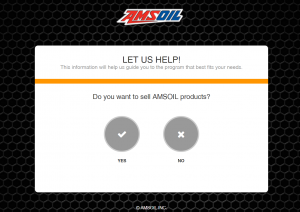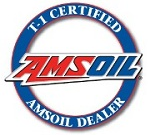Continuously Variable Transmissions or CVT’s are a relatively new comer to the automatic transmission market. In the last few years automotive manufactures have chosen CVT transmissions because of the high efficiency and smooth operation.
AMSOIL Synthetic CVT fluid was released for sale on May 1st, 2014. After a period of extensive testing an evaluation, AMSOIL is manufacturing a high quality product. CVT’s are here to stay and AMSOIL supports automotive manufactures with a fluid that not only works but outperforms many of the “factory fill” fluids.’
Understand what a CVT transmission is and why it is so important to use a high quality fluid for maximum performance and protection read the Q&A below:
Question:
What is the target market for AMSOIL CVT fluid?
Answer:
The main two markets for AMSOIL Continuously Variable Transmission Fluid are do-it-yourselfers (DIYer) and Independent automobile service centers looking for a cost effective/high quality alternative to expensive vehicle manufacturer fluids.
Question:
Why is it important to use a high quality CVT fluid?
Answer:
The metal-to-metal frictional properties of the belt or chain interface with the pulleys in CVTs are extremely important, and the fluid plays a critical role to preventing slipping. Damaged CVTs result in costly repairs, so it is very important to use a quality fluid. Never use an automatic transmission fluid in a CVT and always check the owner’s manual to be sure which fluid is recommended.
Question:
Can a DIYer or independent automobile service center change CVT fluids?
Answer:
Check for detailed information on the vehicle, but the answer is yes for many vehicles equipped with a CVT. The fluid is relatively simple to change and many applications have a drain plug and fill plug, similar to a differential, making it easier to change than a traditional automatic transmission fluid. Most belt-and-chain type CVTs use 8-10 quarts of fluid for a total fill, and about half of it is replaced with a simple drain and fill. If additional “how-to” advice is needed, consult an automotive service center or the vehicle’s service manual.
Question:
What are the major differences between a continuously variable transmission (CVT) and an automatic transmission?
Answer:
Automatic transmissions have a defined set of gears (4-speed, 5-speed, 6-speed etc.) which are used based on the vehicle speed. The transmission automatically selects the next gear as the car accelerates and more speed is required. A CVT creates unlimited gear ratios using a belt or chain running between 2 variable-diameter pulleys. In a traditional automatic transmission vehicle the operator can feel the car shifting into different gears while accelerating. In a continuously variable transmission vehicle the operator does not feel any gear changes when vehicle speed is increased. The advantage of a CVT is its ability to keep the engine in the rpm sweet spot, resulting in better fuel economy and a smoother ride.
Question:
What is the difference between a CVT and an eCVT?
Answer:
The eCVT (electronic continuously variable transmission) uses a more conventional planetary gear set that is controlled by an electric motor to create continuously variable gear ratios. The Toyota Prius eCVT is the most common and specifies a regular automatic transmission fluid, such as AMSOIL ATF or ATL. The fluid’s primary function is to lubricate the planetary gears. The traditional CVT or belt/chain and pulley type is designed very much like the transmissions used in snowmobiles, ATVs etc. It has either a metal belt or a chain that rides between two pulleys. This design relies heavily on the friction characteristics of the fluid to ensure that the belt or chain continuously contacts the pulleys without slipping.
The design is distinctly different from both regular stepped automatic transmissions and the eCVTs commonly found in hybrids like the Toyota Prius.
Question:
How has this product been validated for this demanding application?
Answer:
AMSOIL CVT fluid was thoroughly tested in the laboratory against vehicle manufacturer fluids in friction characteristics, wear protection, oxidation resistance and other critical properties. AMSOIL Continuously Variable Transmission Fluid has been tested in the field against Nissan Factory Fill
CVT fluid. In the test, the AMSOIL CVT fluid scored equivalent to or better than the Nissan fluid and provided exceptional protection against belt and chain slipping; the number one concern in CVTs.

Question:
What is the drain interval for AMSOIL CVT Fluid?
Answer:
AMSOIL recommends changing the CVT fluid according to the vehicle manufacturer’s guidelines. Drain intervals between CVT manufacturers vary so it is best to check the owner’s manual for the specific drain interval for each vehicle.
Question:
What package sizes is AMSOIL Continuously Variable Transmission Fluid offered in?
Answer:
AMSOIL CVT fluid is offered in quarts, twin packs and 55 gallon drums.
As you can see in the question an answer section CVT’s require a specifically designed high quality product for maximum performance and transmission life.
Since 1972 AMSOIL has been the leader in synthetic lubrication and continues to be the leader for automotive, trucking and equipment. Rest assured that using AMSOIL CVT fluid in your vehicles transmission will not affect your warranty. With the AMSOIL Warranty Secure program you are covered!
Purchase AMSOIL CVT Transmission Fluid
There are several ways to purchase AMSOIL CVT fluid.
Individual customers can purchase through the AMSOIL Factory Direct Online store.
To sell AMSOIL CVT fluid in your automotive repair shop or auto parts store, become an AMSOIL Retailer Account.








